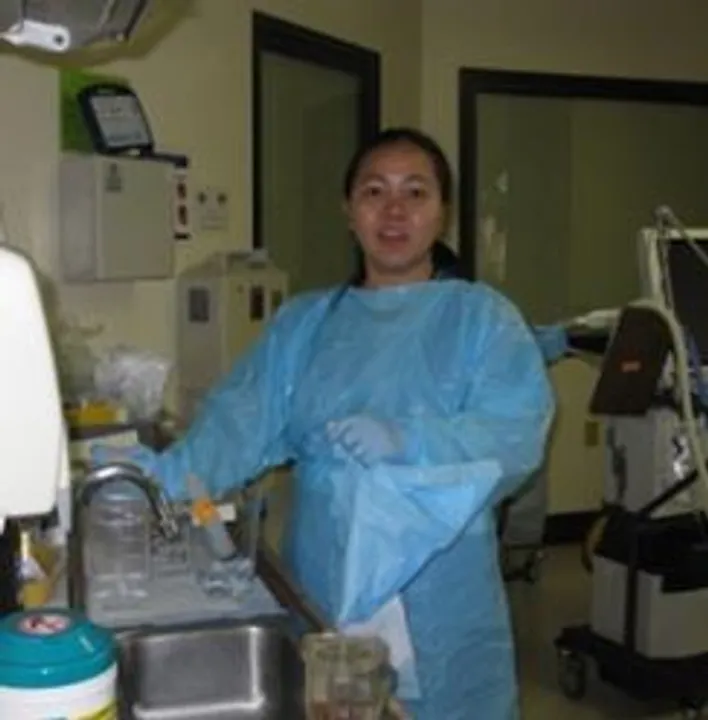Now you are graduated as a new nurse, what next…
After enjoying 40 years of working full time as a nurse, I just want to pass on my thoughts to you as you walk out of the clutches of academia and into a job in a medical center. Your face beams with excitement, and you can’t wait to sign your chart notes with the title of “RN.” Now, your goal should be to hang onto this enthusiasm. When difficult days arise later on, take a moment to reflect back on this first day and recapture the passion and zeal displayed upon your entry to graduated nurse status.

A new graduate nurse at bedside
The first line of advice I pass on to new grad nurses: Always be on time for work! I know you say to yourself, “Yeah, yeah, we already know that.” But stop for a moment. What does punctuality really mean? Punctuality means you accept the responsibility of the registered nurse role, because timely presence at your job signifies your ability to promptly learn about your patients and relieve the nurse currently on duty. Occasional deficits in punctuality for excusable situations (like car accidents) may occur. However, chronically coming in late to work can be called dishonorable and disgraceful to your patients and colleagues. Remember our “Code of Ethics” (2001) indicates our primary commitment is to our patients. Stay on the professional bandwagon, demonstrate your self-respecting substance as a nurse, and be on time.
A second sagacious thought involves establishing relationships with other nurses. This concept appears to be a “no brainer,” but let me tell you that so often nurses remain isolated and refuse to request help from their colleagues working at the same time. Take a couple minutes to introduce yourself to the other nurses as the shift starts or even before, if you arrive at work early. This interaction helps set the stage for later contact. At the beginning of the shift, the nurse captures the information on her patients. If you note from the patient information obtained in the shift report that your patient needs certain treatment requiring two nurses, it makes it easier to ask a colleague you touched base with earlier for help.
A third prudent thought encompasses getting a second opinion from your colleagues. A variety of situations will arise about treatment, medications, or resuscitation orders for a patient that you question being in the sphere of nursing practice. Let me give you an example. A surgeon wrote a physician’s order, instructing the nurse to inject tetracycline into a chest tube. Unfortunately, the nurse did not ask for advice from more experienced nurses, and she administered the drug into the chest tube, causing an anaphylactic reaction. The action by the nurse failed to be within the domain of nursing. The case ended up as a legal case, and the hospital settled out of court for the inappropriate action by a nurse. In speaking with the nurse, she did wonder about the appropriateness of the order, but she felt too intimidated to ask her colleagues. The alert button went off in my head about the extreme importance of communication and assertiveness skills in the practice of nursing. It is no wonder that the Joint Commission lists the first National Patient Safety Goal as communication, because 65 percent of healthcare deaths due to iatrogenic adverse events involve communication.
In my final astute thought, I ask you to take care of yourself. The nurse owes it to herself to maintain her own integrity and safety. Bedsides, nursing involves heavy lifting, arduous tasks like inserting nasal-gastric tubes, suctioning tracheostomies, or starting intravenous lines, to name a few tasks. These demanding and risky procedures potentially expose the nurse to musculoskeletal damage or to pathogenic organisms. Therefore, self-care must include the basic requirements of sleep, nutrition and exercise. It seems so basic, but it is your first line of protection against the alien environment of healthcare settings.
Nursing Jobs
Jobs for all Nursing Specialties
References
American Nurses Association. (2001). Code of Ethics. Retrieved from http://www.nursingworld.org/MainMenuCategories/EthicsStandards/CodeofEthicsforNurses/2110Provisions.html (8/14/2020 this web page is no longer active)
The Joint Commission. (2014). National Patient Safety Goals. Retrieved from http://www.jointcommission.org/standards_information/npsgs.aspx
Related Posts
